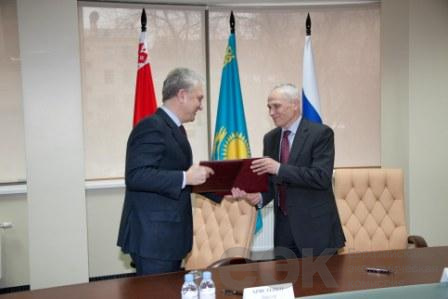EEC signed a memorandum of understanding with the Standing Committee of the Union State of Russia and Belarus
13.12.2012
 On December 13, the Eurasian Economic Commission (EEC) signed a Memorandum of Cooperation between the EEC and the Standing Committee of the Union State of Russia and Belarus.
On December 13, the Eurasian Economic Commission (EEC) signed a Memorandum of Cooperation between the EEC and the Standing Committee of the Union State of Russia and Belarus.
The document was signed by Victor Khristenko, Chairman of the EEC Board, on behalf of the Commission and by Grigory Rapota, State Secretary, on behalf of the Union State.
“We signed a memorandum of cooperation between the two structures actively involved in the integration processes, and it actually symbolizes our interactions in all most important areas of competence, from statistics to mutual involvement in the drafting and issue of regulations,” Victor Khristenko said during a media briefing.
The Memorandum is expected to set up cooperation in the following areas:
trade policy and simplified trade procedures
technical regulation, standardization and uniform measurements
transport and transportation
cooperation in energy sector
interstate programs in industrial and agro-industrial sectors
migration policy
competition policy and pricing policy.
The Chairman of the Board noted that the experience accumulated by the Union State in those sectors, in which the union of Russia and Belarus had advanced more than the three Customs Union member-states, was very important for the EEC. “In particular, I mean passport and visa cooperation, and cooperation in the sectors connected with interstate innovation and industry support programs,” Victor Khristenko said.
Answering the question about the development of common approaches to passport and visa issues in the EEC territory, the Chairman of the Board said that “currently our goal is as follows – the Agreement on the Eurasian Economic Union shall enter into force by January 1, 2015. An important section of this agreement deals with free movement of labour. Free movement of labour requires a clear idea of how the passport and visa regime will function.”
Victor Khristenko said that a roadmap which would be acceptable for Russia, Belarus and Kazakhstan could be developed during the next year to liberalize the passport and visa regime and develop common approaches to migration control on the external borders of the Customs Union.
Background information:
The memorandum was prepared to promote the cooperation between the Eurasian Economic Commission and the Standing Committee of the Union State.
The Republic of Belarus and the Russian Federation are active members of both the Customs Union and the Common Economic Space, and the Union State. This links the interests of the Commission and the Standing Committee and opens new opportunities to coordinate their approaches in a number of areas, and share experience and expertise. The memorandum will also have a positive impact on further development of the integration processes in the Customs Union and the Common Economic Space.
On December 13, the Eurasian Economic Commission (EEC) signed a Memorandum of Cooperation between the EEC and the Standing Committee of the Union State of Russia and Belarus.
On December 13, the Eurasian Economic Commission (EEC) signed a Memorandum of Cooperation between the EEC and the Standing Committee of the Union State of Russia and Belarus.
The document was signed by Victor Khristenko, Chairman of the EEC Board, on behalf of the Commission and by Grigory Rapota, State Secretary, on behalf of the Union State.
“We signed a memorandum of cooperation between the two structures actively involved in the integration processes, and it actually symbolizes our interactions in all most important areas of competence, from statistics to mutual involvement in the drafting and issue of regulations,” Victor Khristenko said during a media briefing.
The Memorandum is expected to set up cooperation in the following areas:
trade policy and simplified trade procedures
technical regulation, standardization and uniform measurements
transport and transportation
cooperation in energy sector
interstate programs in industrial and agro-industrial sectors
migration policy
competition policy and pricing policy.
The Chairman of the Board noted that the experience accumulated by the Union State in those sectors, in which the union of Russia and Belarus had advanced more than the three Customs Union member-states, was very important for the EEC. “In particular, I mean passport and visa cooperation, and cooperation in the sectors connected with interstate innovation and industry support programs,” Victor Khristenko said.
Answering the question about the development of common approaches to passport and visa issues in the EEC territory, the Chairman of the Board said that “currently our goal is as follows – the Agreement on the Eurasian Economic Union shall enter into force by January 1, 2015. An important section of this agreement deals with free movement of labour. Free movement of labour requires a clear idea of how the passport and visa regime will function.”
Victor Khristenko said that a roadmap which would be acceptable for Russia, Belarus and Kazakhstan could be developed during the next year to liberalize the passport and visa regime and develop common approaches to migration control on the external borders of the Customs Union.
Background information:
The memorandum was prepared to promote the cooperation between the Eurasian Economic Commission and the Standing Committee of the Union State.
The Republic of Belarus and the Russian Federation are active members of both the Customs Union and the Common Economic Space, and the Union State. This links the interests of the Commission and the Standing Committee and opens new opportunities to coordinate their approaches in a number of areas, and share experience and expertise. The memorandum will also have a positive impact on further development of the integration processes in the Customs Union and the Common Economic Space.
